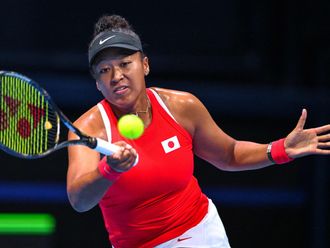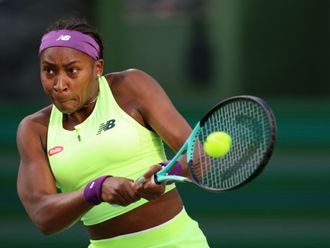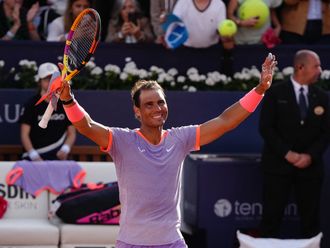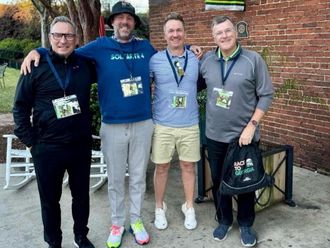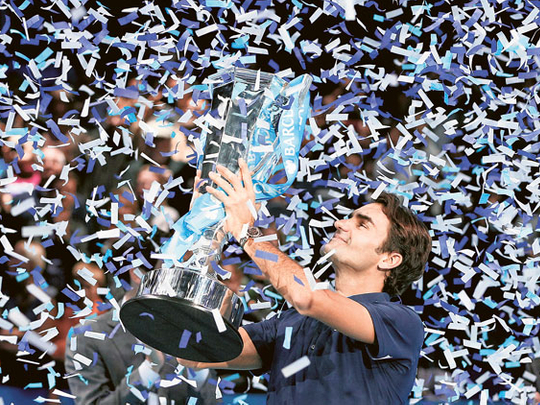
London: We live, it is said, in the golden age of tennis. The final tournament of the year, which reached its climax in London last Sunday night, was meant to be a celebration of that excellence. Why, then, did it more closely resemble a field hospital?
The Association of Tennis Professionals — that curious accommodation between management and labour that works almost despite itself, sport's equivalent of a post-war northern Co-op — brings the eight best players in the world to the banks of the Thames each November to fight for a prize of £1 million (Dh5.71 million) in the one tournament that is its own property.
It is a contract that runs until 2013 and, when the ATP sits down to allocate the next venue, bidding will be fierce.
The players who make it to this golden finishing line, clearly, do not lack for motivation. And, for millionaires, it is not just the money. They want bragging rights, locker-room credibility, respect.
When their work is done, these elite athletes with temperamental bodies and minds retire to their warm-weather havens and prepare for the start of another season.
Again the World Tour Finals, sponsored enthusiastically by Barclays, is a daily sell-out, a well-run tournament in a spectacular setting.
What could be more perfect? Rarely has the sport been blessed with such wonderful talent operating near capacity, providing fans with a rolling narrative of intense rivalry from January to Christmas as Novak Djokovic, Rafael Nadal, Roger Federer and Andy Murray engage in a personal battle of wills and sinew, all the while looking out for the challenges of Jo-Wilfried Tsonga, Tomas Berdych, Mardy Fish and Janko Tipsarevic, the other players in the final act, and a swathe of younger, rising aspirants.
Yet tennis is red-lining. There is too much of it, at least for the elite players, and it will not change without pain. The 2012 season has been shortened by two weeks but the contraction means the BNP Paribas Masters in Paris will now be rammed up directly against London, with barely enough time for the finalists to catch the Eurostar and get to the practice courts of the O2 Arena.
Intractable conundrum
Pleasing sponsors, television, tournament organisers, players and public seems an intractable conundrum. Next year there is the complication of the Olympics, when tennis returns to Wimbledon three weeks after the All-England Championships.
There is always the Davis Cup, of course, and that unwieldy, nostalgic beast roams the planet eating up recuperation time virtually without pause. Suggestions that it be compressed into a two-week tournament have been rejected in the past and, until the crisis worsens to the point of revolt, will continue to be ignored. It is the players who should decide. They are the entertainers. They generate the crowds and the revenue, not administrators and TV suits.
They have it in their power to make a statement. What they need is the will and the leadership. But they suffer from greed, too. Not many of them will turn down lucrative invitations to exhibition tournaments, while simultaneously whingeing about the physical and mental loads they have to bear.
All but one of the combatants in Greenwich has limped in and out of post-match press conferences since last Sunday to complain, with varying degrees of subtlety and conviction, about chronic and fleeting aches and pains, from groin to brain, that have hampered their performance and commitment.
Nearly all of them have looked shattered, none more so than Murray, who arrived with three recent titles and high hopes as well as a strained groin, a sore elbow, a tight hamstring, a curiously sore right buttock and a frazzled spirit.
Murray gave up the fight after losing to David Ferrer in his first match and his No 3 world ranking to Federer. The others struggled through. They did not have the sheen of champions. They had the pallor of prisoners. But it is in their gift to escape. They are not slaves.
This is the warfare of modern tennis. For all but the winner the O2 Arena is their Waterloo. Only the 30-year-old Federer, the oldest player left standing after a week of occasionally outstanding but largely uneven tennis, seems capable of consistently handling the rigours of his calling.
The Swiss, a master of insouciance as well as the court, sees less cause to complain about the schedule than Nadal, Murray and others, who contemplated strike action after the US Open.
— Guardian News & Media Ltd



